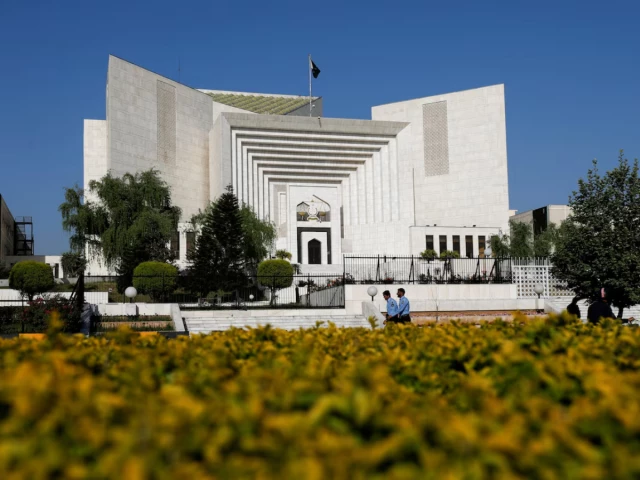Police officers walk past the Supreme Court of Pakistan building, in Islamabad, Pakistan April 6, 2022. REUTERS
ISLAMABAD:
After the amendment was passed, Chief Justice of Pakistan Yahya Afridi convened a full court meeting on November 15. However, the Supreme Court justices could not agree to comment on the 27th Constitutional Amendment.
It was perhaps the first time that a full court meeting was held in the CJP room, in the presence of more than a dozen judges.
It is learned that two proposals were given to the SC judges during the meeting.
The first concerned collective resignation. The second concerned the approval of the proposed declaration regarding the 27th Amendment.
The proposed declaration states that the 27th Constitutional Amendment has been passed by the Legislature, which is binding, and that the Federal Constitutional Court (FCC) has been established and that any challenges to the 27th Amendment will be brought before the FCC.
However, no consensus could be reached on the proposed declaration. A section of the bench was of the view that the proposed declaration would constitute an endorsement of the 27th Constitutional Amendment.
In order to avoid dissenting opinions, the statement on the amendment could not be published. Sources also confirmed that the idea of a collective resignation was raised with the judges during the meeting.
It is also learned that CJP Afridi did not read Justice Salahuddin Panhwar’s letter regarding holding a full court meeting on the 27th Constitutional Amendment, and the sealed envelope of the letter was returned to Justice Panhwar during the meeting.
CJP Afridi also dismissed rumors that he had held discussions with the government to restore his title of ‘Chief Justice of Pakistan’ through a specific constitutional amendment.
However, when the draft of the 27th Constitutional Amendment was tabled in the Senate, Justice Afridi became aware that the words “Chief Justice of Pakistan” were deleted.
With that, he decided to submit his resignation as CJP. Subsequently, the government retained its title in the amendment.
Lawyers question whether, when government officials informed it of the proposed 27th Amendment, the CJP should have immediately convened a full court meeting to discuss the institutional response.
Even Justice Afridi did not convene a meeting on the letters written by Justice Syed Mansoor Ali Shah, Justice Athar Minallah and Justice Salahuddin Panhwar.
Legal opinions are divided over the filing of a petition against the 27th Amendment by four judges of the Islamabad High Court. The SC Registrar’s Office declined to act on their request.
A lawyer, however, said that throughout the world, in constitutional jurisprudence, it has been established that it is an inherent jurisdiction of this court to check the vires of any exclusion clause which excludes the jurisdiction of the said court.
Former Additional Attorney General Tariq Mahmood Khokhar said the “27th Constitutional Amendment” was an absurd nullity.
Khokhar said this purports to erode constitutional and democratic fundamentals, violating the fundamental structure of the Constitution, including the principles of separation of powers, judicial independence and rule of law. It gives power to the FCC at the expense of the SC.
“It was adopted by an unelected parliament, lacking constitutional and democratic legitimacy. A parliamentary law is accepted by the courts at face value, without needing the support of a higher authority.
“But a law passed by an unrepresentative Parliament has no face value in itself; it is not an Act of Parliament. As such, it suffers from procedural and substantive invalidity,” he said.
He said there was no break in legal continuity. The SC judges have not changed their judicial loyalties. They are bound by their oath. The SC has not issued any institutional response to the 27th Amendment.
“It is up to the SC to decide what it will recognize as valid legislation,” Khokhar said, adding that the SC, sitting as a full court, is an appropriate forum to rule on the constitutionality of the 27th Amendment.
Conversely, the FCC is the creation of the 27th Amendment, its members hand-picked by the executive branch. For many observers, this smacks of executive capture. “As such, he should not be the judge of his own cause,” Khokhar said.




